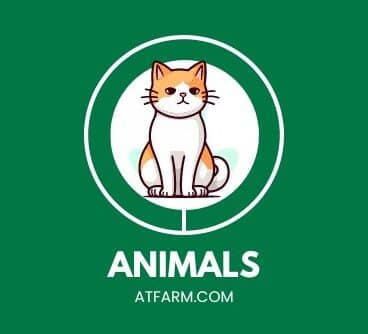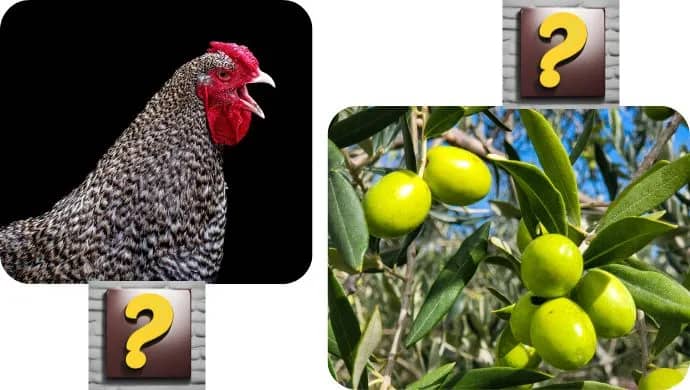Olives, no doubt, are completely safe for our consumption, but chicken lovers like me always prioritize the chicken diet. They consistently look out for “Can chickens eat this and this?”
And one question is this, “Are olives safe for chickens to eat?“
The quick answer to this question is this: Chickens will eat olives when you put them in front of chickens.
Chickens not only enjoy eating olives, but olives also provide some health benefits to chickens health. So, why not provide olives to our chickens for their better health?
This entire guide about olives will provide helpful information, and let’s start to explore.
Are Olives Safe for Chickens to Eat?
Olives are one of the treats that chickens want to eat. So, one part of the question is satisfied, but our concern is that this treat is toxic for chickens.
Alright, olives are generally considered a safe treat for chickens. However, allowing chickens to consume excessive amounts of olives can be harmful to their health.
This does not apply only to olives but to any treats given without a proper routine, as they may pose a risk to the chickens’ well-being.
Olives are loaded with vitamin E and antioxidant properties. Although olives contain too much fat, but some fats are healthy for chickens’ health.
Most chickens do not get enough fiber from their diet due to digestive issues. Olives are an excellent source to help boost fiber intake in chickens.
Olives provide vitamin E, and chickens need almost every vitamin to get healthy. However, vitamin E provides better egg production, a better immune system, and improves muscles in chickens.
So, in short, olives are safe from all aspects, but every treat has pros and cons that we are going to discuss further in detail below.
Why Chickens Need Olives to Eat?
Usually, broiler chickens do not need any treats or healthy foods other than their specific chicken feed. The reason is that broiler chickens are raised just to fulfill the meat requirements.
That’s why broiler chickens have a shorter lifespan and come under the knife within 50 days of life.
So, now our concern is, ‘Why do pet chickens need olives?’
Generally, pet chickens or hens are naturally strong, but their diet also plays a critical role in their strength.
That’s why when we try to catch a hen, it is difficult if the hen runs in an open area. And you’ll be tired within a few minutes while your hen will be far away from you.
Here below are some points that indicate the importance of olives when fed in limited quantities to chickens:
- Fast Growth:
Most chicken owners want their chickens to grow as fast as possible, but not like broiler chickens. However, I prefer that my chickens don’t grow quickly because I find small chicks beautiful.
So, olives contain all the essential nutrients that will boost the chicken’s growth.
- Diseases Repellent
Olives, as well as olives oil both have magical effects on chickens and human health, but this magic turns into real magic when used too much.
Olives improve the immune & circulatory system. So, when a chicken’s immune system becomes stronger, it will save our chickens from vets.
- Stress Killer
Most chickens become sick due to stressful environments. Keeping 10 to 15 chickens in a small coop will definitely cause stress.
So, start by modifying the chicken coop, then use a stress killer and provide a few olives to the chickens. Usually, olives are good for blood circulation & this treat will help the heart to better supply the blood.
In this way, olives provide relief to some extent.
What are the side effects of feeding olives to chickens?
As I mentioned earlier olives are completely safe for chickens to eat, but now another question arises here. What should we do?
The simple and quick answer to this question is that every treat that is not part of the chicken’s diet provides benefits and side effects.
To prove this point, let’s see how:
Watermelon is considered a healthy treat for chickens because it keeps chickens hydrated & cool during the summer season.
But this watermelon can turn into an unhealthy treat when fed too much to chickens.
Here are some points that indicate how olives are toxic for chickens if fed in large quantities.
- Sodium and Kidney Issues: High sodium content in olives can cause kidney problems in chickens.
- Choking Hazards and Olive Pits: Olive pits may be hard to digest, so pits should be removed before feeding.
- Digestive Upset: The fat content in olives may cause digestive upset in chickens if consumed in large quantities.
- Nutritional Imbalance: Feeding olives regularly may cause a nutritional imbalance in chickens as they lack the essential nutrients necessary for their health.
Which Olive Color is Good for Chickens?
All types of olives are typically good for chickens regardless of their color. There are generally 500 different types of olives that are grown worldwide.
From these 500 types, 90% are used for making olive oil, while 10% are used for eating. So, black, green, yellow, and purple olives are 100% safe for chickens to eat, but moderation is compulsory.
However, kalamata olives are considered a healthier option than the remaining types of olives.
However, chickens like to eat foods that are in blue or light green colors.
Can Chickens Eat Olive Pits, leaves, and Seeds?
Olives are just only safe for your chickens when you give them without pits and seeds. And what about leaves?
Alright, the leaves of any anti-toxic tree are generally safe for flocks or birds. Below is a table that contains nontoxic & toxic plants or trees for chickens.
Toxic Plants | Non Toxic Plants |
Azalea | Mint |
Beans | Oregano |
Castor Beans | Garlic |
Ivy | Thyme |
Foxglove | Rosemary |
Nightshades | Comfrey |
Carelessweed | Alfalfa |
Horsenettle | Clover |
Bull Nettle | Grass |
Black Locust | Sunflowers |
Ferns | Fennel |
The seeds of olives are harder to digest, and these seeds don’t provide any health benefits for chickens.
So, when you want to give olives, make sure the olives are pitted, and you can also cut them into small pieces.
Although chicken’s digestive system is not sensitive, but some seeds pose a risk to their health.
And What About Baby Chickens?
Baby chickens that are still growing but not fully grown may have a weaker digestive system. Usually, all treats are safe just for chickens not for baby chickens.
Although there is no doubt that olives are full of nutrients, but these nutrients are beneficial for above three-month-old chickens.
Based on my experience, as recently as April 2024, I gave some pieces of cooked bread to my baby chickens. What do you think will happen?
Alright, two of my chicks stopped eating. I was worried and wondered what my chicks had eaten that made them sick.
Suddenly, I remembered that yesterday, I provided some pieces of bread. This bread turned out to be a bad treat for chicks.
My baby chickens are two months old. It’s important to note that bread, although very soft, can be difficult for some chicks to digest.
Therefore, always provide a consistent diet to your baby chickens until they are over three months old.
FAQ
Can chickens safely eat olives?
Yes, chickens can eat olives. However, olives are not part of the chicken’s daily diet. Olives are also a treat for chickens, and treats are given with great caution.
Are olives beneficial for chickens?
Yes, olives are considered a good source of healthy fats and vitamin E for chickens. Olives can improve the digestive system, strengthen the immune system, and are beneficial for muscle health.
How often can I feed olives to my chickens?
One to two olives in a week are generally good and safe for chickens. However, olives also contain salt and antioxidants and consuming too much salt can be harmful to chickens.
What are the signs of olive digestion problems in chickens?
Generally, olives without pits can be easily digested by chickens. However, signs of digestive problems may include decreased appetite or other health issues.

Hi, my name is Zubair Saeed. My education is graduation with a BSc, plus half a master’s degree. I have been writing articles about pets and animals for over a year. My second priority, after humans, is animals. Read more about me.



